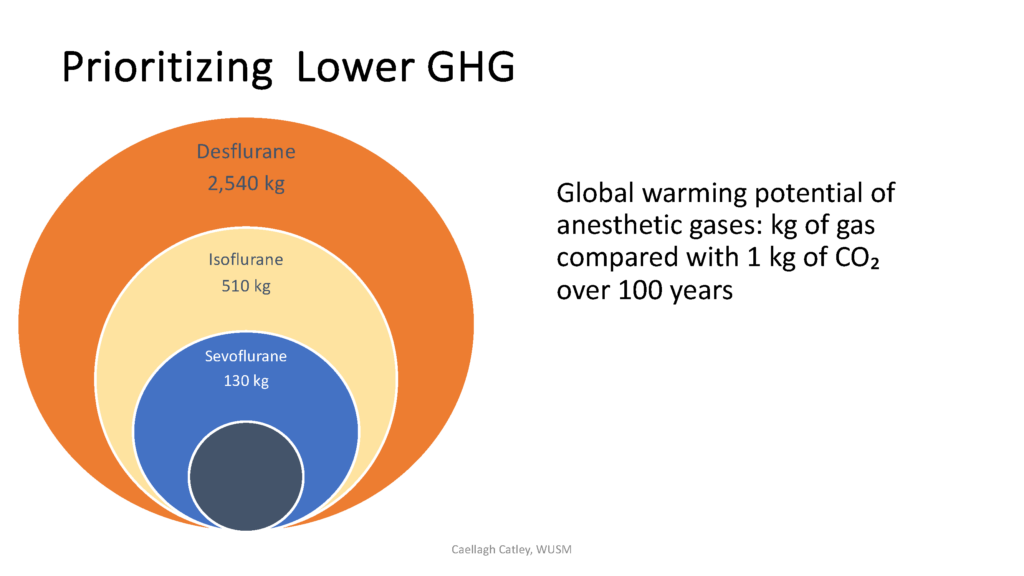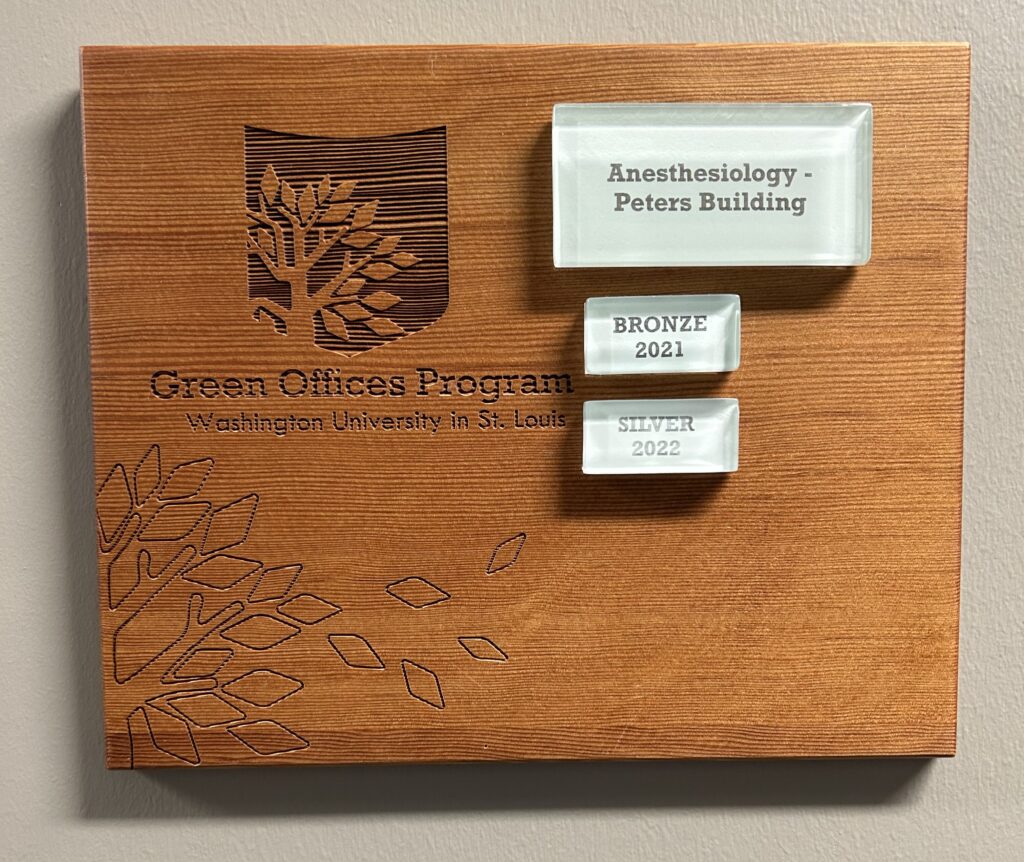The Well-being Word

Associate Vice-Chair of Well-Being
Pursuing something you are passionate about can significantly improve your well-being. Engaging in activities that align with your passion can provide fulfillment, increase positive emotions, boost your mood, and even reduce stress.
I know that all of us are very busy at work (and home), but sometimes, getting involved with something at work that you are passionate about can dramatically improve your well-being. This month, I wanted to highlight some of our incredible team members who are passionate about sustainability and how they bring their knowledge, dedication, and enthusiasm to this crucial topic to create meaningful and impactful change here in the Department of Anesthesiology.
Cultivating Well-being looks different for all of us; what steps do you take to improve your personal well-being and the well-being of those around you?
Please check out all of the fantastic contributions of these dedicated teammates—they are changing the world and our department with their outstanding efforts!
Yours in wellness,
Erin
The Well-developed Podcast — New Episode!
Guest speaker Alicia Ott joins us again to discuss all things sleep. We dive deep into strategies for rotational shift workers on how best to develop healthy sleep habits and cycles. Learn what sleep hygiene means and small steps you can take to improve your sleep so that you can learn and perform at your best. Whether you are a great sleeper, a terrible sleeper, a new parent, or a night shift worker, we have tips to help anyone find better sleep.
WashU Anesthesia Sustainability Team


Sustainability is the responsible use of resources in order to meet the needs of the present without compromising the ability of future generations to meet their own needs. Sustainability is paramount for the well-being of individuals and the planet. Embracing sustainable practices ensures the preservation of natural resources, reduces pollution, and mitigates the impacts of climate change. By promoting sustainable agriculture, renewable energy sources, and eco-friendly technologies, societies can enhance environmental quality, conserve biodiversity, and safeguard ecosystems. Furthermore, sustainability promotes social equity, ensuring that vulnerable communities have access to clean water, nutritious food, and adequate healthcare.
This month’s newsletter is dedicated to exploring the multifaceted world of sustainability. We’ll delve into innovative solutions, inspiring stories, and impactful initiatives that are shaping our path toward a more sustainable future. By prioritizing sustainability, we not only protect the Earth’s fragile ecosystems but also create a healthier, more equitable world for current and future generations, fostering a sense of well-being that extends far beyond individual lives.
Low-Flow Anesthesia Project
Inhalational agents are significant contributors to hospital greenhouse emissions, accounting for about 50% of all perioperative emissions. They are also costly. To address these ethical and financial concerns, members of our clinical team introduced the Low-Flow Anesthesia Project. The goals of the initiative were two-fold:
- Minimize/eliminate the use of desflurane (DES), the most expensive agent with the worst carbon footprint.
- Institute low fresh gas flow of sevoflurane (SEVO), per the FDA guidelines (1-2 L/min).
The effects were profound and sustained: there has been a significant reduction in overall BJH expenditures on inhalational agents despite higher surgical volumes and complete replacement of DES by SEVO (and isoflurane), with BJH becoming a DES-free facility. (slide 4).





Green Office’s Report
The Knight Center on Danforth Campus played host to this year’s Green Carpets Awards ceremony, which took place on November 7, 2023. We are thrilled to share that, for the second consecutive year our PVT and Peters Building Anesthesia Offices received the prestigious silver badge in recognition of our commitment to best practices in the energy, waste, purchasing, and office culture categories. This award underscores our dedication to sustainability, a value that resonates deeply with our ever-growing team.

The ceremony was presided over by the Associate Vice Chancellor for Sustainability, alongside sustainability representatives from the McKelvey School of Engineering and the Medical School. During the event, our anesthesia team and leaders of the Low-Flow Anesthesia Project were recognized as Sustainability Champions, further highlighting our remarkable commitment to advancing sustainable practices.
Featured Member: Elizabeth Schappe

My name is Elizabeth, I live in Webster Groves with my husband and three children (Gracie, 16, Killian, 10, Theo, 6).
I spend lots of time doing normal mom stuff like driving my children all over and making mediocre dinners. I also spend time teaching my children about climate change and some of the things we can do to mitigate or adapt to our changing climate.
We are currently having a great time trying to grow, forage, and eat Missouri native plant species. Biodiversity plays a key role in ecosystem resilience and adaptation to climate change, and native species are key to maintaining biodiversity. This fall, we foraged, peeled, cracked, and ate black walnuts. My hands were stained brown from the walnut skin for a few weeks!
When I am not foraging, I spend my time working as the vice chair of the Webster Groves sustainability commission and finding ways to be active. To stay active, I signed up for an adult gymnastics class last year, did a team biathlon this fall, and I play on a cool volleyball team.
To fund all my antics, I have the pleasure of working as a CRNA in the anesthesia department. I love being a part of our department because it is full of wonderful and passionate people. My passion is planetary health and human health. If you share this passion and would like to learn more about the intersection between biodiversity and human health, please join me for the Webster Groves eco-ed series on November 16th. Washington University Professor Mark Manteuffel will discuss the connections and feedback loops between ecosystems and human health and wellbeing. His talk will address actionable items we can take as individuals to sustain healthy ecosystems, including ecogardens. Click here for details!
What’s next?
Institute true low fresh gas flow (FGF) for SEVO, with fresh gas flow rates of 0.5 – 1 L/min.
Until recently, we observed the FDA guidelines for SEVO FGF of not less than 1L/min for up to 2 MAC hours, or not less than 2 L/min for longer procedures. The main concern is that reduced flows can result in the accumulation of Compound A with the potential for nephrotoxicity. While SEVO can interact with some absorbents to produce Compound A, it has never been shown to result in renal toxicity in humans. Anesthesia Patient Safety Foundation (APSF) and many major academic institutions now fully endorse true low-flow SEVO administration (0.5 – 1.0 L/min fresh gas flow) as a safe, effective, and environmentally advantageous modality of administering inhalational anesthesia.
Caution: Whereas the low FGF inhalational anesthesia is safe when administered properly, there are potential risks inherent to this technique. The slow changes in the oxygen and anesthetic concentrations during the low FGF may predispose to delivering a hypoxic gas mixture or inadequate anesthetic concentration, which can result in hypoxemia, awareness, or inadequate surgical anesthesia. Whenever the concentration of oxygen or the anesthetic agent needs to change rapidly, the FGF should be promptly increased. Because of the slower kinetics of gas changes during the low FGF, maintenance of inhalational anesthesia is the safest phase to reduce the FGF while maintaining the target concentrations of oxygen and anesthetic.
Reducing utilization of Nitrous Oxide
An upcoming initiative will focus on the reduction in the use of nitrous oxide in BJH periop. Nitrous oxide has a significant global warming potential with a long atmospheric life, of well over 100 years. Because of that, many academic centers are eliminating nitrous oxide from their inhalational gas portfolio. We will work in the near future on gradually phasing out nitrous oxide from most anesthetizing sites. We do envision keeping it available for certain specialty applications (e.g., OB). More information to come on this initiative.
Sustainability News
Reducing Carbon Footprint in Pediatric Anesthesiology: The Greenhouse Gas Project
WashU Anesthesiology receives Silver badge at Green Carpet Awards
Leave the Leaves (Links to an external site)
Resources
Practice Greenhealth
Practice Greenhealth is the leading membership and networking organization for sustainable health care, delivering environmental solutions to hospitals and health systems across the United States.
WU Sustainability
Washington University in St. Louis is fully committed to being a national leader in sustainability, a core priority that runs through all aspects of our community, our operations, and our work as a leading teaching and research institution.
APSF Low-Flow Anesthesia
This outstanding resource gives clinicians an opportunity to learn about the principles and practice of low-flow inhalational anesthesia via an interactive simulation module.


